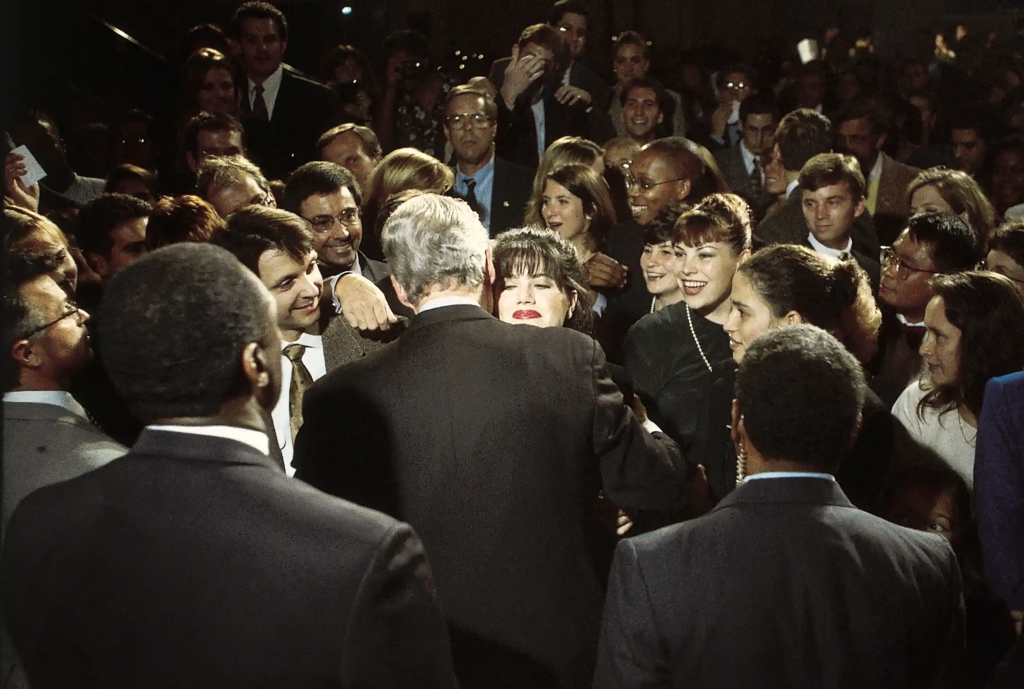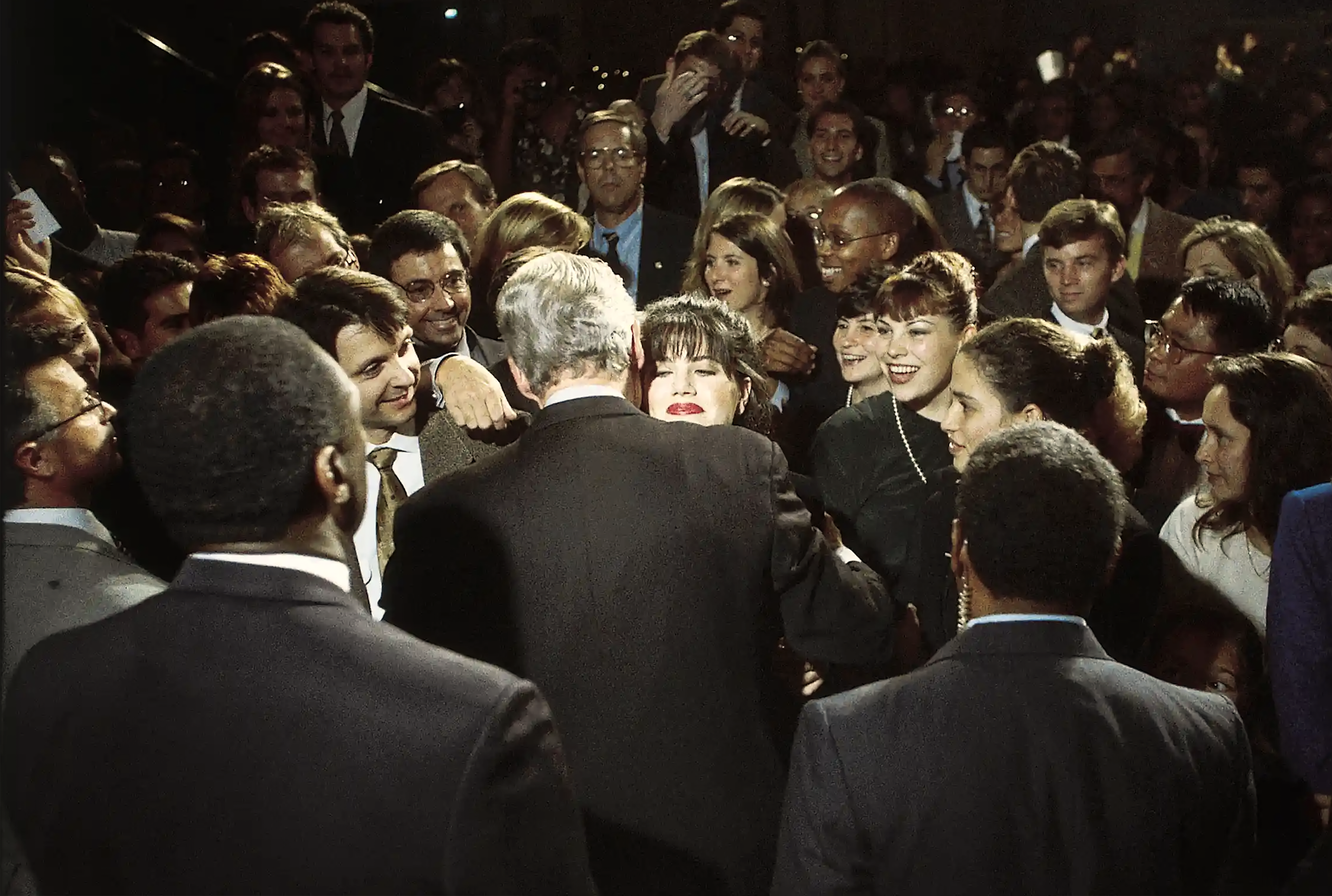
Clinton-Lewinsky. Photo by Dick Halstead. Used by contract with Getty Images
While Trust and Confidence is now available through several online sources (Amazon, Google Play, Barnes & Noble, Apple), I thought I’d revisit an excerpt from the book when Secret Service director Lewis Merletti was preparing a presentation for Ken Starr.
First some Cliff’s Notes.
During the 1998 investigation of President Bill Clinton, independent counsel Kenneth Starr compelled Secret Service agents to testify about what they may have seen or heard regarding Clinton’s relationship with White House intern Monica Lewinsky.
Merletti argued that if agents were allowed to testify about anything other than criminal acts, it would compromise the trust and confidence tenet critical to the protective mission of the Secret Service. “Proximity” Merletti made clear to me, “is necessary between agents and protectees. If the president knew that agents could testify in court about private conversations, the president would push away protection” leaving them vulnerable to assassination.
After receiving subpoenas for agents’ testimony, Merletti was preparing a presentation for Ken Starr detailing Secret Service history and the importance of proximity. He believed that Starr would understand the risk to presidents if agents were allowed to testify.
Here is how Merletti described part of that presentation to me.
After moving through a series of slides about previous assassinations, Merletti pulled up a photo of a motorcade in Tampa, Florida.
“President John F. Kennedy, November 18, 1963. Four days before Dallas,” Merletti described as he clicked to another slide with an enlarged inset showing two agents on the back bumper of Kennedy’s limo.
“That’s special agent Clint Hill and another agent, on the back bumper of the president’s limo in Florida.”
Clint Hill is well-remembered as the agent who climbed on the back of Kennedy’s limo in an effort to save the president’s life.
“Four days before Dallas,” Merletti said, “Kennedy ordered agents off the back of the car. Kennedy said that the agents were creating a barrier between the people and the president.
Merletti handed me a photo from the Dallas motorcade several blocks before the final stretch in front of the School Book Depository. “I’ve never seen this before,” I said.
“No one has.”
The photo shows Hill crouched on the back bumper of Kennedy’s limo as it’s traveling down the route in Dallas.
“I called Clint in,” Merletti said. “Clint, you know we’re being challenged by Ken Starr. I’m trying to put a presentation together to talk about the possibility of us being pushed away.” He pointed to the photo. ‘How did you end up on the back of the president’s limo, four days later?’”
“Lew, I hoped that this picture would never come out,” Hill began. “I’m on the follow-up car, and I knew I was not allowed on that limousine. All of us knew that.
“I can’t tell you what it was, Lew, a sixth sense, but something was wrong that day. I don’t know if people were too close, or the crowds were too big. I didn’t think that the president was going to be shot. I just didn’t feel comfortable. The next thing I know, I come off the follow-up car and get on the president’s limo, and I know I’m not allowed there. So, I get right off and go back to the follow-up car.
“Within minutes,” Hill said, “it’s overpowering, again . . . something is wrong. So, I come off the follow-up car and go back to the limo. I did it three times. The photo you caught is about a minute before the first shot is fired.
“I go back to the follow-up car and I hear it . . .” Hill made a clapping sound with his hands. “I knew, right in my gut.”
Moving his head to the left, Hill described, “I had to come all the way around, and I actually saw the barrel coming back in and I could see smoke. I knew he was shot.
“I came off the follow-up car and I’m digging in. In my mind’s eye, I’m seeing a guy working a bolt, coming back down for the second shot. And then I hear it. It came from the exact same spot. The second shot is when the president goes like this . . .”
Hill mimicked Kennedy’s hands to his throat.
“Now, I know he’s hit. With every muscle fiber I have, I’m digging into the pavement. I’m trying to get to that car. I don’t know, is the guy reloading again? Is another one coming? I’m getting closer. I’m almost there and . . . [Hill claps his hands, again] . . . the president’s head vaporized in front of me. I knew at that moment he was dead.”
Starr’s insistence on agent testimony would undercut protection, open the door to the likelihood of another presidential assassination. All that lived in the back of Merletti’s mind as he listened to Hill.
“Had me and the other agent been standing on the bumper,” Hill said, “one of several things would have happened. Either Oswald would have had no shot, or he’d have shot one of us, or maybe he’d have shot, but we’d have stood a chance.
Hill stared into his past. “We failed our mission. The president died, and it was my fault.”
“It wasn’t your fault.”
“Every night when I put my head on the pillow, those demons come and visit me.”
“Lew don’t let Ken Starr do this. We got pushed away by the president. Don’t let another agent follow in my footsteps. Promise me that you’ll fight this.”
“I promise.”
Throughout his 6-month battle with Starr and even though agents’ testimony was a dead end, Merletti demonstrated the courage and integrity in protecting his agents from giving testimony despite the consequences to his reputation and his job.
Integrity is a word we don’t hear much today. But it wasn’t always the case.
We fought wars for moral reasons. We stood up to dictators for moral reasons. Now, America is at war with itself for reasons I just don’t understand.
We’re not a perfect country, but we have always demonstrated the moral resolve to work through our differences.
Lew Merletti’s integrity is a model for each of us to turn away from our worst impulses and live up to the best we can be.
God knows we need that today, more than ever.
Comments











